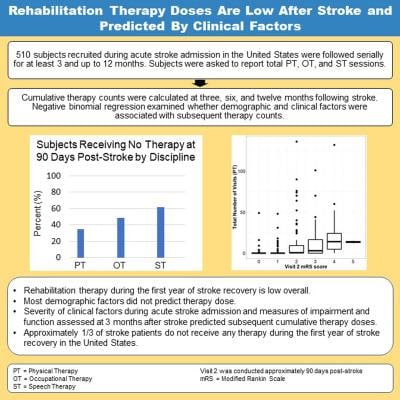
March 15, 2023 — Many patients don’t receive much rehabilitation therapy following a stroke, despite strong evidence that higher amounts can reduce long-term disability, according to a new UCLA-led study that tracked over 500 patients across 28 acute care hospitals in their first year following a stroke.
The new research, published in the peer-reviewed journal Stroke, is the first U.S.-wide study to find that patients who had more severe strokes received higher amounts of rehabilitation therapy, a welcome finding. “But in the bigger picture, the findings reinforce that too many patients are missing out on a golden opportunity to maximize recovery during a critical period following a stroke,” said the study’s lead author, Steven Cramer, MD. Stroke is a leading cause of long-term disability in the United State and can affect speech, memory, and mobility, among other impairments.
“In the initial weeks after a stroke, the brain is ready to undergo maximum rewiring to get people back on their feet. Rehab therapy helps maximize this recovery, with higher rehab therapy doses helping more, but what we found in this study is that most patients are getting rather small doses of rehab therapy,” said Dr. Cramer, a stroke neurologist and professor of neurology at the David Geffen School of Medicine at UCLA and the California Rehabilitation Institute.
Among the Study’s Key Findings:
--Many patients tracked in this study did not receive any rehabilitation therapy after their stroke. After three months, about one-third of patients had not received physical therapy, almost half had not received occupational therapy, and over 6 in 10 did not receive speech therapy.
--Those who did receive rehabilitation therapy typically had six to eight sessions by three months after their stroke – and between 0 and 1.5 sessions the rest of the year.
--Where patients were sent following hospitalization also mattered. Those who were discharged home had the lowest levels of rehabilitation therapy, regardless of the severity of their stroke.
--Hispanic patients received disproportionately lower amounts of physical therapy and occupational therapy.
Cramer said it is important for future research to examine the feasibility of providing higher therapy doses to stroke patients.
The other study authors are Brittany Young, MD, PhD, of UCLA and the California Rehabilitation Institute, and Alison Holman, PhD, FNP, of the Sue and Bill Gross School of Nursing at UC-Irvine.
For more information: https://www.uclahealth.org/


 February 03, 2026
February 03, 2026 









